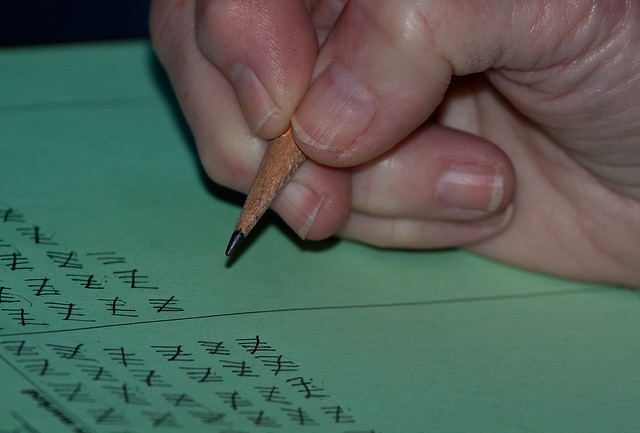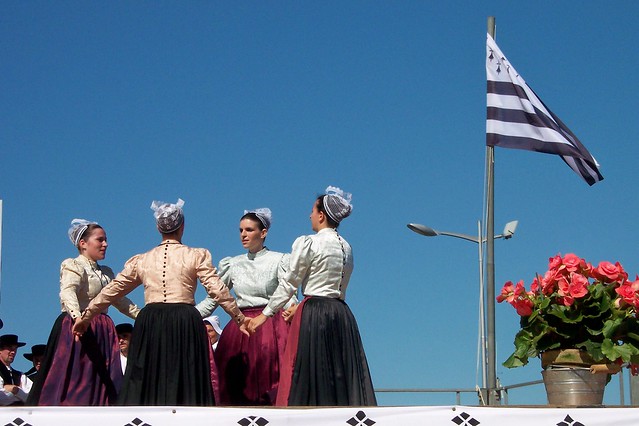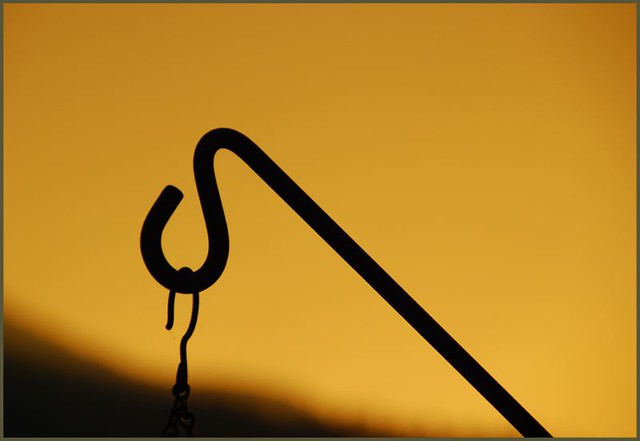Words for baskets and related things in Celtic languages.
| Proto-Celtic | *kleibo = (?) |
|---|---|
| Old Irish (Goídelc) | clíab = basket, breast, chest, ribcage |
| Middle Irish (Gaoidhealg) | clíab = basket, skep, bee-hive, coracle, currach, breast, bosom cliabach = slender-bodied cliabaire = infant cliabán = cradle, bird-trip, bird-cage |
| Irish (Gaeilge) | cliabh [klʲiəvˠ/klʲiəw] = ribbed frame; body, chest, bosom; creel, pannier basket cliabhadóir = creel-maker cliabhadóireacht = creel-making cliabhaire = basket-carrier, travelling poultry-dealer cliabhán = cradle, wicker cage cliabhrach = bodily frame, chest, thorax; (person of) large frame |
| Scottish Gaelic (Gàidhlig) | cliabh [kliəv] = basket, creel, pannier, ribcage, straightjacket cliabhadh [kliəvəɣ] = (act of) putting into a creel cliabhan = small creel, small hamper, wreckage, broken timbers cliabhadair, cliabhair [kliəvədɪrʲ] = basket-maker |
| Manx (Gaelg) | clean = pannier, potato creel, twig basket; cot, cradle |
| Middle Welsh (Kymraec) | kauell, cawell = basket, pannier, cradle cawelleit = basketful, hamperful, quiverful |
| Welsh (Cymraeg) | cawell = basket, pannier; cradle; fish-trap, creel, cage; quiver; belly, breast cawellaf, cawellu = to put into a hamper or basket; cradle cawellaid = basketful, hamperful, quiverful cawellig = little basket cawellwr = basket-maker, maker of wicker fish-traps |
| Middle Cornish (Cernewec) | cawal, cauwal, cowal = hamper, basket, pannier cawel gwanan beehive |
| Cornish (Kernewek) | kowel = hamper, basket, cage kowel gwenen beehive kowel-gwari = playpen kowella = to cage |
| Old Breton | cauell, cauèl, queuel, qavell = cradle, trap, locker |
| Middle Breton (Brezonec) | kavell, kavel, kevell, cauell = cradle, trap, locker kavell-bez = tomb kavellad = contents of a trap kavellañ = to put in a basket |
| Breton (Brezhoneg) | kavell = cradle, trap, locker kavell-bez = tomb |
Etymology: from the Proto-Indo-European *ḱley- (to lean) [source]. Celtic words for fence, hurdle, lattice and related things come from the same root: more details, as do words for left and related things.
Words from the same Proto-Celtic root, via Gaulish and Latin, include claie (wicker rack, trellis, hurdle) in French and cheda (wattled laterals at the base of a traditional cart) in Galician [source].
Words from the same PIE root include client, climate, clinic, incline and lean in English, leunen (to lean) in Dutch, lehnen (to lean) in German, chinàre (to bend) in Italian, and clemente (lenient) in Spanish [source].
| Old Irish (Goídelc) | ces = basket |
|---|---|
| Middle Irish (Gaoidhealg) | ces = basket, hamper, pannier, bee-hive, skep, causeway of hurdles |
| Irish (Gaeilge) | cis [cɪʃ] = wicker container, basket, crate, plaited or crossed twigs as support for causeway ciseach = wattled causeway, improved path, footbridge, over soft ground or drain, hamper ciseachán = breadbasket, stomach ciseán = (wicker) basket ciseadóir = wicker-worker, basket-maker ciseadóireacht = wicker-work, basketry ciseog = shallow basket (for potatoes, etc) cispheil = basketball |
| Scottish Gaelic (Gàidhlig) | cis [kʲiʃ] = (large) woven/wicker basket, wickerwork panel, hurdle ciseach [kʲiʃəx] = wickerwork path/bridge ciseag, cisean, ciosan = small woven basket or creel, kishie cisean [kliəvədɪrʲ] = basket-maker |
| Manx (Gaelg) | kishan = skep kishan pabyr = waste paper basket kishan shellan = hive |
Etymology: from Old Norse kista (chest, box), from Latin cista (trunk, chest, casket), from Ancient Greek κίστη (kístē – box, chest, casket), from Proto-Indo-European *kisteh₂ (woven container) [source].
Words from the same roots include chest in English, kist (chest, box, trunk, coffer) in Scots, Kiste (box, crate, case, chest) in German, ciste (chest, coffer, treasure, fund) in French, cesta (basket, hamper) in Spanish [source].
| Irish (Gaeilge) | bascaed = basket |
|---|---|
| Scottish Gaelic (Gàidhlig) | basgaid [basgɪdʲ] = basket basgaid-arain = breadbasket basgaid-bidhe = hamper basgaid-sgudail = wastebasket ball-basgaid = basketball |
| Manx (Gaelg) | basca(i)d, baskad, bastag = pannier, potato creel, twig basket; cot, cradle bastag arran = breadbasket bastageyr = basket maker |
| Middle Welsh (Kymraec) | basged, bascet, basced = basket, basketful basgedeit = basketful, hamperful |
| Welsh (Cymraeg) | basgeg = basket, basketful basgedaf, basgedu = to place in a basket, to make baskets basged(i)aid = basketful, hamperful basgedwaith = basketry, basketwork, wickerwork basgedwr, basgedydd = basket-maker |
| Middle Cornish (Cernewec) | basced = basket |
| Cornish (Kernewek) | basket = basket |
Etymology: from Middle English basket, from Anglo-Norman bascat (basket), possibly from Late Latin bascauda (a woven mat or vessel to hold basketwork), from Proto-Celtic *baskis (bundle, load), from Proto-Indo-European *bʰask- (bundle), or non-Indo-European source.
Words from the same Proto-Celtic root include bâche (tarpaulin, canvas sheet, cover) in French, vascullo (broom, bundle of straw) in Galician, basket in English, فَشْقَار (fašqār – a heap of sheaves) in Arabic [source].
Other words from the PIE root *bʰask- include fascis (bundle, burden, load, high office) in Latin, and possibly bast (fibre made from certain plants used for matting and cord) in English, bast (bast, raffia) in Danish, bast (inner bark, velvet, skin, hide) in Dutch, and bashkë (together, simultaneously) in Albanian [source].
There are more details on the Burdensome Loads Celtiadur post, and the Celtic Pathways Baskets episode.
Words marked with a * are reconstructions.
Sources: Wiktionary, Am Faclair Beag, Online Manx Dictionary, Teanglann.ie, eDIL – Electronic Dictionary of the Irish Language, In Dúil Bélrai English – Old Irish glossary, Geiriadur Prifysgol Cymru, Gerlyver Kernewek, Gerlyvyr Cernewec, Dictionaire Favereau, TermOfis, Le dictionnaire diachronique du breton, Geriafurch, English – ProtoCeltic WordList (PDF), Etymological Dictionary Of Proto Celtic











